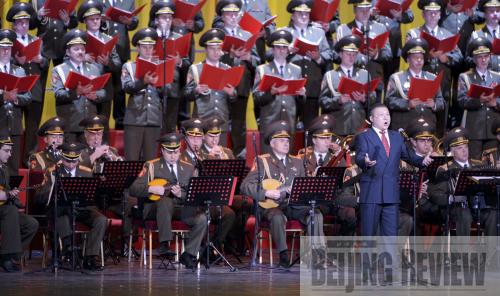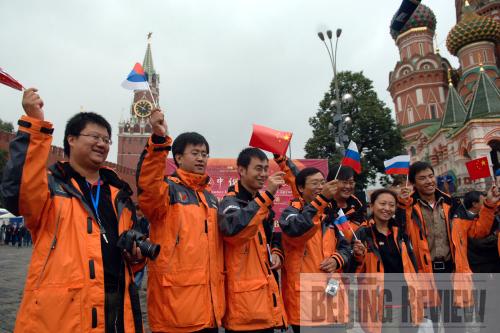|
 |
|
A CHORUS CROSSING BORDERS: Chinese and Russian artists perform a musical at the closing ceremony of celebrations commemorating the 60th anniversary of China-Russia diplomatic relations and the Year of the Russian Language in China in Beijing on October 13 (ZHANG DUO) |
Since 1949, China and Russia have seen their relations evolve through dramatic twists and turns—from a friendly alliance based on goodwill and mutual interests, to tense confrontations, and finally to good neighborliness, upon which new foundations are systematically being built.
Indeed, Sino-Russian relations have now been elevated to something of a prototype in the realm of state-to-state relations. Faced with the global financial crisis, to take a notable example, both sides have strengthened strategic coordination in a bid to safeguard shared interests, while promoting world peace and sustainable development.
Underscoring these developments, Russian Prime Minister Vladimir Putin visited Beijing from October 12 to 14. Putin's visit, of course, has further strengthened bilateral strategic cooperation.
Bitter confrontations
On October 2, 1949, the day after the People's Republic of China was founded, the Soviet Union became the first country to recognize and establish diplomatic relations with the New China.
The next year, on February 14, 1950, Beijing and Moscow grew closer, signing the Sino-Soviet Treaty of Friendship, Alliance and Mutual Assistance. This agreement enabled the two countries to enhance their ties in fields ranging from politics and economy to science, technology and culture.
 |
|
A FRIENDSHIP TOUR: Visiting Chinese journalists pose for a photo at Moscow's Red Square on September 4, 2006 (WEI ZHONGJIE) | Under the aegis of further economic cooperation agreements—subsequently signed in both May 1953, and October 1954—Moscow helped Beijing rebuild 156 large, state-owned enterprises during China's first five-year plan from 1953 to 1957.
It was no small form of assistance. Moreover, this in turn, greatly contributed to the development of China's national economy in the 1950s and 1960s. In fact, New China's heavy industry was, in the end, mostly established with the help of Soviet experts.
Later in the 1950s, however, Sino-Soviet relations began to sour. Ideological disputes broke out between the two countries' leaders. Consequently, the Soviet Union withdrew its experts from China in 1960. The result was a cessation of cooperation in science and technology between the two nations. These disputes would later fuel border disputes and violent conflicts.
A thaw in relations
When Mikhail Gorbachev took power in March 1985, he brought a way of "new thinking" with him to the Kremlin, and began to strive for normalization of Sino-Soviet relations.
|
